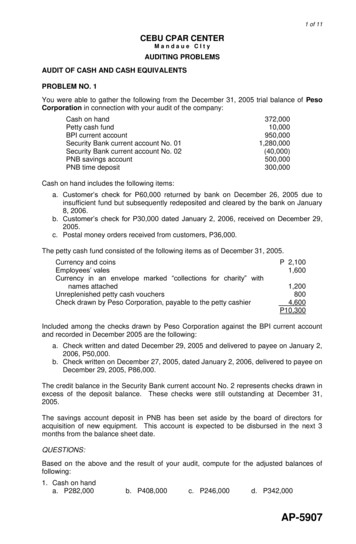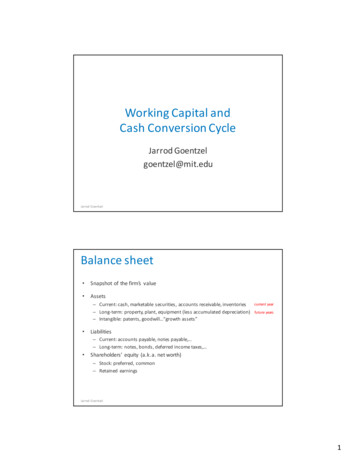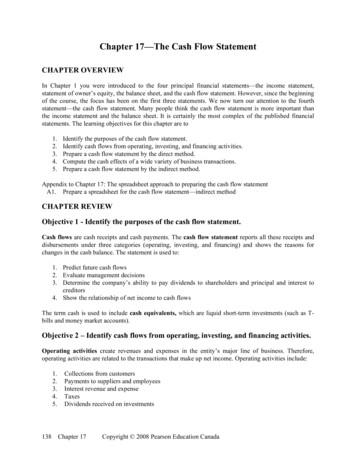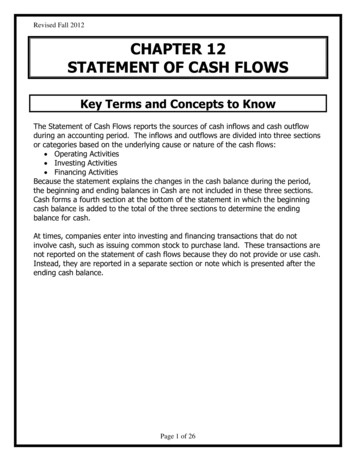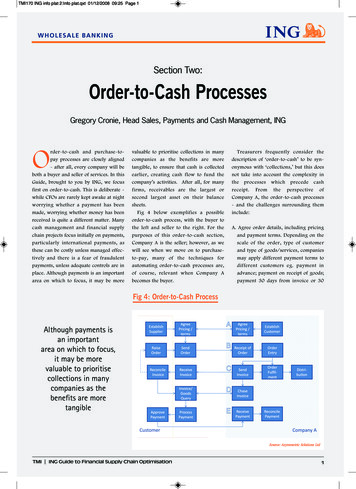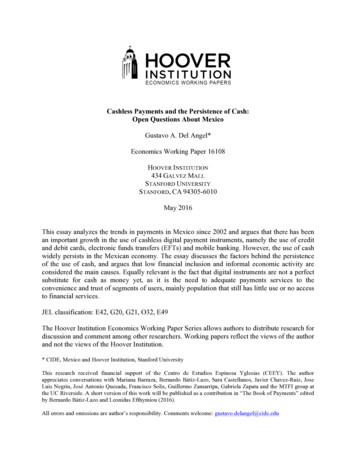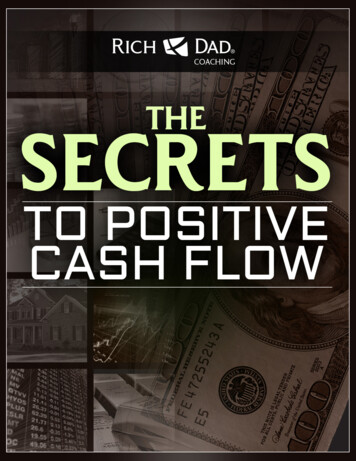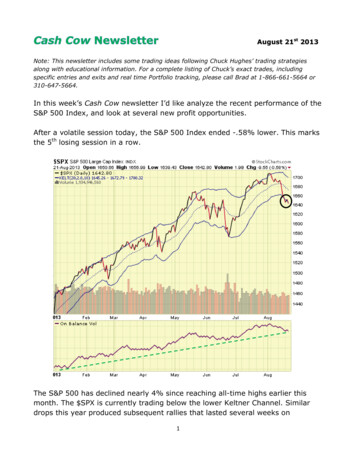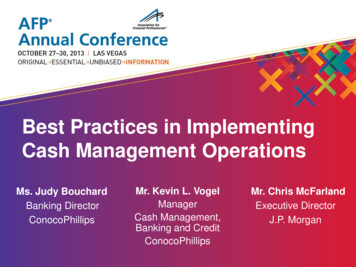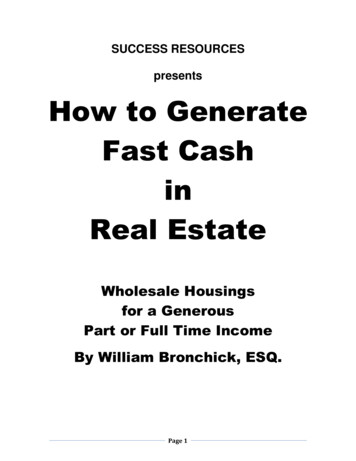
Transcription
SUCCESS RESOURCESpresentsHow to GenerateFast CashinReal EstateWholesale Housingsfor a GenerousPart or Full Time IncomeBy William Bronchick, ESQ.Page 1
ABOUT THE AUTHORWilliam Bronchick is a natonally-known attorney, author, entrepreneur andspeaker. Mr. Bronchick has been practicing law and investing in realestate since the early 90′s, having been involved thousands of real estatetransactions. He has trained countless people all over the Country tobecome financially successful, speaking to audiences of as many as16,000 at mega-events, sharing the stage with names like Rudy Guliani,Steve Forbes, and Colin Powell.His best-selling book, “Flipping Properties,’ was named one of the ten bestreal estate books of the year by the Chicago Tribune.William Bronchick is also the author of the highly acclaimed books,“Financing Secrets of a Millionaire Real Estate Investor“,”WealthProtection Secrets of a Millionaire Real Estate Investor“, “Defensive RealEstate Investing” and his latest work, “How to Sell a House Fast in a SlowReal Estate Market”.William Bronchick is the co-founder and President of the ColoradoAssociation of Real Estate Investors and the Executive Director ofthe College of American Real Estate Investors. He is admitted to practicelaw before the bars of New York and Colorado and is a member of theColorado and American Bar Associations. He is also a licensed realestate broker in Colorado.Page 2
IntroductionWholesaling, flipping, quick turning — whatever name you call it, this type of real estateinvesting is attractive to novice and experienced real estate investors alike. Whether youare just getting started or have a few deals under your belt, are looking for cash flow,security or long-term wealth, I can help you reach your financial goals.But how, and more importantly, where do you get started? If your real estate investingexperience extends to your personal residence, your mind may be brimming withunanswered questions about every aspect of wholesaling — from locating the deals tonegotiating the terms to selling the contract. Where can you find answers to these everimportant questions that will take you from an interested observed to an active andsuccessful investor? This book, of course!This book is arranged in 15 chapters to answer your wholesaling questions in logicalprogression. You’ll learn step by step how to generate cash by finding, buying andquickly reselling (flipping) properties. You can read it straight through, cover to cover, orjump around to get the answers to the questions that are at the forefront of your mind. Letthis book be your guide as you navigate the always exciting, but sometimes intimidating,world of wholesaling real estate.The principles in this book work. They work all the time and in every market. Thevariable, in most cases and with most deals, is you. If you’ve done your homework, builtyour buyer’s list, found a truly motivated seller, and priced the property right,wholesaling can be the start of a whole new career for you and the source of profits andpersonal satisfaction.Perhaps the most important question you’ll be able to answer yourself after reading thisbook is how you’ll spend your newfound profits. Whether you want to pay off amountain of debt, fund a dream vacation or even replace your present 9-to-5, go-nowherecareer, this book will help you earn the cash you need to accomplish your goals.Page 3
Chapter 1: Why Wholesaling?The lure of real estate investing has always been seductive, but never more so than rightnow. The proliferation of real estate television shows (Flip this House, Get it Sold, andothers of their ilk) has captured the imaginations of the American public. Couple thiswith the current market of bargains galore and you have an entire segment of thepopulation salivating to “get in the game.”What tempers that rabid enthusiasm for traditional real estate investing is usually aheaping helping of reality. The realization of what’s needed besides excitement and drive— cash and credit, to name just a couple of things — is a sobering thought.However, traditional real estate investing is not the only way to participate in the realestate industry. Sure, “buy and hold” is a great strategy, but most certainly not the onlypath to profits.A more important question for novice real estate investors is not “Can I get in the game?”but “How can I get in the game?” There’s more than one way to skin a cat and there’smore than one way for you to invest in real estate.To see which method might be right for you, let’s take a look at some investingapproaches. Remember, this is not an “either-or” scenario. You may want to start downone path and then add another as your skills, resources, and knowledge increase.What Are the Principles of “Buy and Hold?”Buy and hold is what most people think of when they think of real estate investing.That’s the traditional approach to real estate. You invest money into a property, keep itmaintained and rented, and then sit back and wait. If you bought well, the rent more thancovers the debt service. You have positive cash flow and appreciation. Then, 30 yearslater, the mortgage is paid off and your rental house investment will fund your goldenyears.Why is this a good strategy? Historically, property values in the United States haveappreciated at a rate greater than inflation. If you buy in the right neighborhoods, yourannual appreciation may reach double digits. You can use properties with equity ascollateral. You can provide rental income for your retirement years, and you can passproperty down to the next generation. Once your properties are owned free and clear, youhave passive income that pays you even when you are not working.All in all, buy and hold is a good approach. It usually works and many people havebecome wealthy following this path. Rental properties continue to be an excellent vehiclefor creating long-term wealth and income for retirement. However, as mentionedpreviously, acquiring and managing rental properties requires cash for down payments,credit to obtain financing, and time to deal with tenants.Page 4
However, buy and hold is not without its drawbacks. The main disadvantage is that yourassets are not liquid. Unlike stocks or bonds, real estate is not easily converted to cash.When selling real estate, you have to locate a buyer, then pay closing costs, titleinsurance, real estate commissions, and possibly a local property transfer tax.If you must sell when the market is down, you will not get the best price. If you have atenant in your property under a lease, you cannot simply kick the tenant out. You have towait until the lease expires, pay the tenant to leave early, or hope to find a buyer whodoesn’t mind having someone living in the property. And, of course, the future is alwaysuncertain. While real estate may have appreciated in a particular area an average of 10percent over the last 20 years, it may not do so in the future.If you hold properties, you also risk running into negative cash flow. There may be timeswhen your properties are vacant or need repairs, and you have to dip into savings to feedthe proverbial “alligator.”If you are a beginner, you may want to get some experience and working capital beforeventuring into buying and holding rentals.What Is Speculating?Speculators are the gamblers of the real estate investing industry. They buy property orinvest in development projects they expect will go up in value, creating a good return onthe capital invested. The increased value depends largely on factors outside their control,such as rezoning, surrounding developments, and market inflation. Although manypeople have made millions of dollars on real estate speculations, just as many have gonebankrupt. You can see how speculating is a roll of the dice and not the best path forinexperienced investors.What Is the “Nothing Down” Approach?Anyone who has had a sleepless night or two in the past decade has probably seen thelate night television gurus espousing a “nothing down” philosophy. These smilingsalesmen trot out successful students to provide anecdotes attesting to the veracity oftheir “nothing down” investing principles.The people who invest with nothing down usually do so because they have nothing to putdown. That means most of the funds for the acquisition price are borrowed. Highlyleveraged real estate purchases can often lead to negative cash flow when vacancies ariseor when repairs or even routine maintenance is required. These people have no cashreserves when the going gets tough and may lose their properties during difficult times.That doesn’t mean you can’t buy properties with nothing down. Just be wary ofexaggerated claims that real estate investing is a fast or easy way to get rich. In realestate, a general rule is you can get a good price or good terms, but usually not both.Page 5
When it comes to investing, you can always try different approaches, but in general, realestate is like any other business, not a get-rich-quick scheme. It takes time, knowledgeand hard work to accumulate wealth. In fact, most start-up companies actually losemoney their first year or two. The companies that survive past the first few years,however, often become profitable and continue to grow. While you may make moneyright away in your real estate business, you may not see a substantial profit for severalyears.If you are going to treat real estate investing like a business (something we heartilyrecommend), pay attention to basic business principles. Watch your cash flow. Generateworking capital before you buy properties that are keepers. While a comfortableretirement is a worthy goal for all real estate investors, we all have to pay bur bills alongthe way; equity will not feed you and your family. A sound businessperson focuses firston generating cash flow, then on growing the business. The real estate business is noexception.What About Wholesaling?I’m glad you asked! Obviously, we feel wholesaling — quick turning or flippingproperties rather than holding long-term — is a viable and profitable real estate investingstrategy. After all, we dedicated this entire book to the practice.The main advantage of wholesaling is that you get your cash out now rather than later.For many people, the certainty of getting a paycheck right away is highly appealing.Wholesaling takes the real estate market out of the equation; if you buy a propertycorrectly, the market is almost irrelevant except concerning how long it will take to resellthe property. Of course, if you buy cheap in a soft market, you can afford to hold aproperty six months instead of two.Wholesaling is generally good for your cash flow, which is important in any business.However, if you purchase houses and acquire too much equity and not enough cash, youmay get into a cash crunch if you don’t have additional income.Don’t forget that you can wholesale houses as a part-time or full- time business. You cando as much or as little as you want and can take a break from your flipping business whenyou desire. In short, once you empty your inventory, you are not tied to your business.You can take long vacations or pick up and move to another city and start over.Now for the “flip” side (if you’ll forgive the pun). The primary disadvantage ofwholesaling properties is that it is “hands-on” income. Once you stop wholesaling, youstop making money. If you are young and like to work for a few months, then take a fewmonths off, that’s fine. But at some point, you will realize that, if you keep spending theprofits, you don’t accumulate wealth.Also, wholesalers lose the benefit of market appreciation. While gauging the market is arisky venture, a good market timer can gain wealth quickly with little effort by buyingPage 6
properties at the right time in emerging markets. We have seen many investors get richsimply by being at the right place at the right time. On the other hand, if you buy aproperty in the wrong place at the wrong time - particularly for the wrong price - you canend up with a property you cannot get rid of quickly enough. You could also get in overyour head in a rehab project and have to bail, losing tens of thousand of dollars.In some cases, holding property will generate more long-term wealth for you thanwholesaling. Therefore, you may consider wholesaling some properties and holdingothers. Or you may consider wholesaling for a while, then begin holding properties later.The nicest thing is that as a smart and educated real estate investor you have options.How great is that?To determine whether wholesaling or holding is better for you, ask yourself thesequestions. Do I need additional income now or in the future? Am I in a high income tax bracket and so would be adversely affected by earningmore income now? Does my local real estate market present opportunities to acquire bargains, whilestill commanding high rents that would cover my expenses if I needed to holdonto the property? Do I have other income or savings that I could tap into in case my rentalproperties become vacant or need repairs? Do I have the time and patience to deal with tenants? Is the local real estate market rising or falling at this time?Most investors start out wholesaling houses, then gradually work into managing rentalhouses or becoming involved in larger, more complex real estate projects. Some peopledon’t have the temperament to deal with tenants and the headaches that come with rentalproperties. Some look for side income by flipping. Others want to quit their jobs andmake flipping houses their full-time business.Consider all options, including a mixture of flipping and holding properties. Be sure toreevaluate your financial goals on a regular basis and adjust your real estate strategies tosupport your goals. If you need help, a coach can provide invaluable assistance indefining your approach and executing your strategy. Visit realestateinvestortraining.comfor more information.Page 7
Chapter 2: Will Wholesaling Work in Your Market?The title of this chapter represents a question we hear often. So often, in fact, that if wehad a dollar for every time a nervous novice investor uttered these words, it might replaceincome from wholesaling itself.People are constantly looking for reasons why something won’t work, and when it comesto why this wholesaling approach won’t work, their market seems to be an idealwhipping boy.Well, we have news for them and for you. Wholesaling — buying low and selling high— works. It works in our market, your market, every market. However, you need to learnyour market and adapt the techniques in this book that it requires.There are many ways to describe real estate markets, including “hot” versus “flat” or“rising” versus “falling” or “buyer’s” versus “seller’s.” Remember, to survive and profitas a flipper, you must buy at an appropriate discount, allowing you to sell the property fora profit. Real estate markets are subject to fluctuations, but these fluctuations typically donot greatly influence the ability for the informed wholesaler to make a profit.In fact, wholesaling can be the least risky way for a beginning investor to make a profit inan uncertain market simply because of the relatively short amount of time he or she willown the property. Unlike the stock and commodities markets, real estate markets don’trise and fall rapidly.Is there an Ideal Market for Wholesaling?In a word — no. That being said, you may find it more difficult to locate bargains inrising markets. That’s because if the market keeps rising, the probability of selling theproperty quickly for a large profit increases. In contrast, when property values are falling,more so-called bargains become available. Yet you need to assess the true value of theseproperties based on when you expect to sell the property. Thus, your purchase must bemade at a steep discount to allow for a profitable sale later, whether that eventual saleoccurs days, weeks or months later.Some basic strategies can be used successfully in virtually all market conditions. Most ofthe following discussion is based on selling properties to owner-occupants, althoughsimilar rules apply to wholesaling properties to other investors.Become educated in your local market first by understanding the large-scale trends—from global down to national, regional, and specific neighborhoods. Learn about targetneighborhoods, enlisting the aid of successful real estate professionals along the way.These professionals will help interpret market indicators, such as the average length oftime houses are sitting on the market this month versus last month or last year. Armedwith this type of information, you will be able to make good decisions.Page 8
How Do Rising Markets Impact Wholesaling?Many would-be wholesalers complain about the high-priced, limited-supply markets thattypically favor sellers. The white-hot real estate boom of a few years ago created risingmarkets in many parts of the country. Some markets are still relatively vibrant today.These markets can provide certain challenges to acquire properties at below-marketprices. However, once a property is secured at an attractive price, you have a great chanceof success to sell it at a healthy profit. Even if it takes a relatively long time to renovateand sell a property, you have the advantage of being able to ask a higher price in a risingmarket.What Does “Inventory” Mean When Talking About Markets?Inventory, defined as the number of properties offered for sale, is a good indicator ofcurrent market trends. If inventory is low because of building restrictions or geography,then high demand will lead to rising prices. In rising markets, sellers often capitalize onthe excitement of new listings to get properties under contract quickly, at premium askingprices.There are also seasonal fluctuations in inventory, such as fewer listed properties in thewinter months than in summer and a surge of listings in the spring. Some areas, such asresort destinations, follow seasonal trends. Generally, seasonal drops in inventory reflectthe trend to market properties more aggressively in spring and summer months when realestate markets are more active. Properties sell year-round, though investors should plan toreduce the price for winter listings or at least know that properties take longer to sellduring those months.How Do Falling Markets Impact Wholesaling?Often, property values are flat or falling in a particular area. This type of market offersgreat opportunity to the savvy investor. When property values are falling, inventory oftenrises, and many sellers become highly motivated when their properties fail to sell quickly.Motivated sellers will do whatever it takes to sell their property. Whether sellers need tomove from the area, are struggling financially or have other pressing reasons to sell, theymay well accept a below-market offer.Investors know that a weak market can offer extraordinary deals, though wholesalersneed to proceed with caution. In a falling market, even a few months’ delay can turn asound deal into a headache. It always pays to know the market and purchase the propertyat a price low enough to net an eventual profit, even if the market continues to fall. Thecommon myth is that you cannot make money by flipping properties in a bad real estatemarket. In a bad real estate market, you can often buy “junker” properties for 50 cents onthe dollar and sell them for 60 cents. It’s all in how you do the math.Page 9
It is also worth noting that markets can and will change. If the market rebounds after apurchase, then all is well for the investor. However, if the market takes a downturn after apurchase, there can be trouble ahead. Markets commonly show signs of slowing orturning over several months. Sometimes the early signs come from national economictrends, such as rapidly rising interest rates or sweeping changes in tax policies that affecthomeownership or investment (e.g., the rapid change in depreciation rules for real estateinvestors in the late 1980s). More likely, clues come from local market conditions, suchas unemployment, oversupply, or a change in demand because of living conditions.Sellers often choose not to believe the market is changing, making it difficult to convincethem to accept a low offer. In these cases, it is best to move on to the next deal, even if itmeans fewer purchases for a few months. It is also worthwhile to follow up with sellerswho weren’t highly motivated. Sellers’ attitudes and situations can change over severalweeks or months of trying unsuccessfully to sell their properties. Eventually, reality mayset in and these sellers will be forced to discount their prices.When it comes time to market a property in a weak market, yours will need to stand outin its price range. The property can still sell quickly, but buyers have a larger selection ofhomes to choose from, so you need to do several things to assure success. First, yourbudget must allow for a longer time to sell. Second, the finished product must be betterthan the other listings being offered, both in appearance and price. Third, you must have agood marketing plan, ideally with multiple exit strategies.Most likely, the property will sell quickly if it fits this description. However, if it does notsell, then the low purchase price allows room in the budget to carry the property for alonger period of time. Ideally, if it simply did not sell and is not showing signs that it willsell anytime soon, you would have the option of holding the property as a rental. That is abetter option then being forced to “give it away.” In many cases, if you cannot sell theproperty in a few months, you can hold it and rent it for several years, then sell it at aprofit.What Does the Term “Balanced Market” Mean?Real estate markets are usually closer to being balanced than they are to being at eitherextreme. In a balanced market, prices are rising at or just above the pace of nationalinflation. Houses within the median price range for the metropolitan area will sell, onaverage, within 60 days. While markets are constantly changing due to circumstancesbeyond anyone’s control, an equalizing effect exists in a free market economy. Often, amarket will exhibit some tendencies of each of the balanced, falling, or risingclassifications. And within a particular market, houses will be selling better or worse insome pockets than in the metropolitan area as a whole.There is profit to be made in a balanced market, following the buy-low/sell-high premise.Remember, as soon as you have the market figured out, it will change. Experiencedinvestors may have an advantage in seeing trends, but no one can foretell the future, andshort turnaround deals usually involve the lowest amount of risk.Page10
Chapter 3: Where Do You Fit in theWholesaling World?When you become a wholesaler, you get a property under contract with the intent to sellquickly for a profit. Usually, that means finding an investor-buyer and flipping theproperty to him. However, this tends to be an oversimplification of the wholesalingconcept. There are actually three distinct roles you can play in any flipping transaction.Which you choose at any given time or with any given deal may have to do with yourindividual preference, time availability, or personal skill set.The three roles are scout, dealer, and retailer. All are components of the wholesaler role.As a wholesaler, you’ll accomplish the same basic task that real estate agents accomplish.You’ll buy properties at substantially less than the going or retail rate. In doing so, youact as both principal and middleman, buying at one price and reselling at a higher price.If a deal is marginal (with not much profit in it) and you add no value to the property,your profit is commensurate with that of a real estate agent. Unlike an agent, however,you may have only a few hours of time tied up in the deal. Furthermore, your upsideprofit potential is much higher than an agent’s commission, because an occasionalbargain purchase can bring a tremendous return.You don’t need a license to wholesale nor must you work under the watchful eye of agovernment agency. Advantages to being a wholesaler vs. a real estate agent include lowoverhead and the ability to work flexible hours.Within your wholesaling endeavors, you may want to work as a scout, a dealer or aretailer. Or, depending on the deal, you may want to act as a dealer on some transactionsand a retailer on others. It’s up to your personal tastes.Let’s look at each of these roles in detail. As we do, think about the one you think youwould be most comfortable assuming.Scouts: Scouts are information gatherers. They find potential deals and sell theinformation to other investors, much like a bird dog that brings ducks back to its master.(In fact, scouts are sometimes called bird dogs.)Scouts find a property for sale, gather information, and then provide this information toinvestors for a fee. The fee varies, depending on the price of the property and the profitpotential. Scouts can expect to make 500 to 1,000 each time they provide informationthat leads to a purchase by another investor.You may want to get started as a scout for other investors because looking for deals doesnot require any cash or prior knowledge. It’s a great, no-risk way to get your feet wet andlearn the wholesaling ropes.Page11
To be a good scout, you need to gather specific information about a property. The moreinformation the better, but at the very least get: Complete property address Owner’s name and telephone number A photograph of the house Financial information including the asking price, loan balance, and whether thepayments are current Details on any property liens Summary of information about the condition of the property Information about the owner’s motivation to sell (e.g., foreclosure, needs repairs,divorce, etc.)You may choose to get most of this information directly from the owner or obtain muchof it from public records or other means.Your most important job as a scout, however, is to identify a property owner who ismotivated to sell at a discounted price. Keep in mind that the owner of a house in need ofrepair is not necessarily motivated to sell. Many property owners can afford to fix aproperty or let it sit vacant for months or even years. The motivated seller does not havethe means or the desire to handle the problems presented by the property.For example, a scout drives by a boarded-up house with an overgrown lawn and oldnewspapers piled up on the stoop. The scout speaks with a neighbor and learns the nameand telephone number of the owner. The scout then talks with the owner and discoversthe property is in foreclosure and the owner does not have the means to repair theproperty or make the mortgage payments. The owner is open to all suggestions, but thescout has neither the means nor the experience to solve the owner’s problem. The scoutsells the information about the property and its owner to another investor.Don’t worry about providing too much information to an investor who then steals thedeal. This rarely happens. Experienced investors know the unhappy scout will not bringany future deals their way.Dealers: Dealers, like scouts, locate deals for other investors, but they take the process astep further. They find a bargain property and sign a purchase contract with the owner.Dealers then can close on the property themselves and sell it outright, or just sell theircontracts to another investor. Dealers are providing more than just information; they arecontrolling the property with a binding purchase contract. Dealers often put up earnestmoney to secure the deal, so they assume more risk than the scout does. Because dealersPage12
control the property with a purchase contract, they have greater profit potential than thescout does.Dealers often resell the property in its “as is” condition. Dealers, however, can sometimesincrease their profits by cleaning up their properties. In fact, a simple cleanup job mayincrease the dealer’s profit by several thousand dollars. While most investors can see pastthe mess, a spruced-up property is psychologically more appealing to any buyer, even anexperienced one. The dealer does not need to perform repairs or upgrades but simplycleans up the appearance of the property by removing junk and debris, cleaning windows,and cutting the lawn. This type of labor can be hired out for a few hundred dollars.Dealers can flip as many deals as they can find. On a full-time basis, a dealer can makewell over 20,000 a month without ever fixing a property or dealing with a tenant. On apart-time basis, a dealer could easily make an extra 5,000 a month flipping a property ortwo. The lifestyle of dealers is that of true entrepreneurs; they can work as much or aslittle as they like with no boss, no employees, and the freedom to do as they please.Retailers: Retailers are not wholesalers bit rather usually buy a property from awholesaler or with the assistance of a real estate agent or scout. The retailer’s goal is tofix up the property and sell it for full retail price to an owner-occupant. Compared toother flippers, the retailer puts up the most money, takes the most risk, and stands tomake the largest profit on each deal. However, it may take the retailer months to realize aprofit, unlike the scout and dealer who make their money in a matter of days or weeks.To become a successful retailer, you need to have a working knowledge of renovatinghomes, particularly the cost of doing so. A good dealer also should have a rough idea ofthe cost of repairs to buy properties at the right price and resell them to the retailer. Adealer who pays too much for a property will have a difficult time reselling it to a retailer.Likewise, the retailer who pays too much will have a difficult time making a profit uponresale to an owner-occupant.Retailers are limited by their financial resources and the number o
His best-selling book, “Flipping Properties,’ was named one of the ten best real estate books of the year by the Chicago Tribune. William Bronchick is also the author of the highly acclaimed books, “Financi
